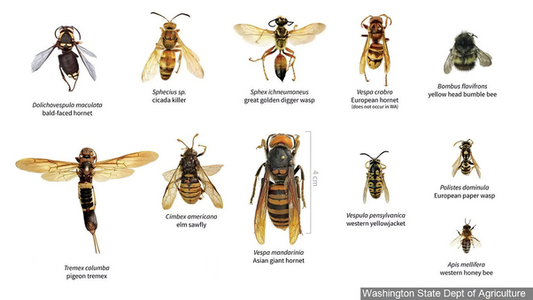- Joined
- Sep 1, 2014
- Messages
- 13,103
- Reputation
- 5,466
- Reaction score
- 46,567
- Points
- 0
- Currently Smoking
- yo arse
Wasps are beneficial for controlling garden pests, pollinating plants, and contributing to a healthy ecosystem. They act as natural pest controllers by preying on insects like aphids and caterpillars, and while they aren't as efficient as bees, they still help pollinate many plants, including some crops. Additionally, research is exploring the medicinal potential of wasp venom and nests, which may have properties that can be used to develop new antibiotics and cancer treatments.
Pest control
- Natural predators:
Wasps are crucial predators that help control populations of many common garden pests, such as aphids, caterpillars, spiders, and other insect grubs.- Protein source for young:
Worker wasps feed their larvae a protein-rich diet of other insects, providing natural pest control without the need for chemical pesticides.
- Protein source for young:
- Plant pollinators:
Wasps are pollinators, helping to transfer pollen between flowers as they search for food, which is important for the health of many plants and crops.
- Specialized pollinators:
Some wasps, like the fig wasp, are the only pollinators for certain plants, such as fig trees, demonstrating their vital role in specific ecosystems.
- Plant pollinators:
- Maintaining biodiversity:
Wasps are an important part of the natural food web, as they are food for other animals like birds and amphibians.
- Yeast carriers:
Some wasps, including hornets and paper wasps, carry yeast in their guts. They consume yeast from late-season grapes and pass it on to their offspring, helping to spread yeast throughout the next season's crop and playing a role in the production of products like bread, beer, and wine.
- Potential medicinal properties:
Wasp venom contains peptides that show potential for killing cancer cells, and some wasp nests have been found to contain compounds that are effective against certain bacteria. - Fig Wasps - no fig wasp = no figs!
-
The Africanised honey bee AKA Killer Bees
Most Dangerous Bees in the World: The Africanised honey bee (Apis mellifera scutellata), known as the “killer bee”, is the world’s most dangerous bee. Originating in Brazil in the 1950s, it aggressively defends its nest, swarming in large numbers and pursuing threats for up to half a kilometre. Their mass sting attacks have caused over 1,000 human deaths.
- Maintaining biodiversity:





 ..here they attack..en mass....
..here they attack..en mass.... ...coz they will come directly for you.
...coz they will come directly for you.


